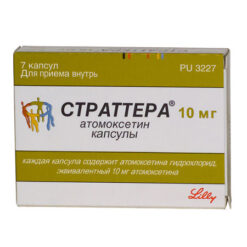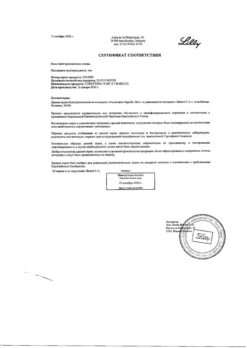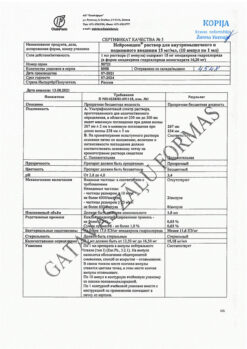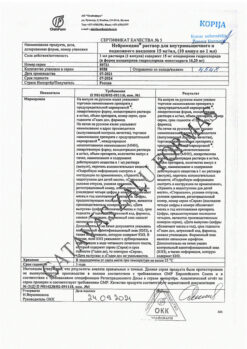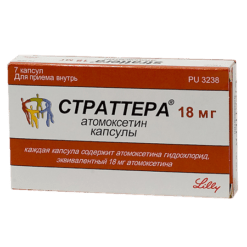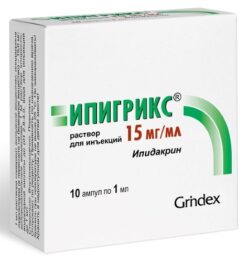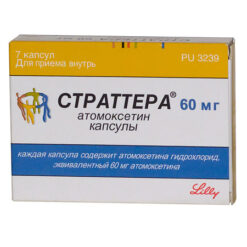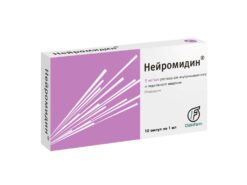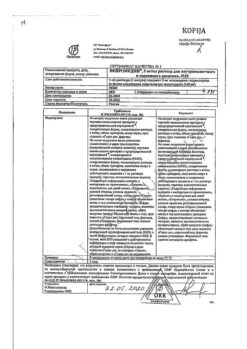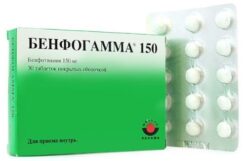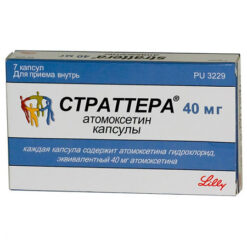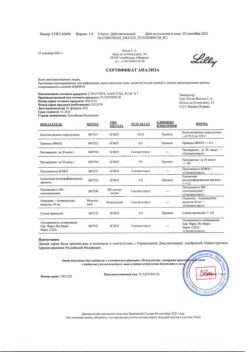No products in the cart.
Memantinol, 10 mg 90 pcs.
€1.00
Out of stock
(E-mail when Stock is available)
Description
Memantine is a potential-dependent noncompetitive NMDA receptor inhibitor with moderate affinity to it. It modulates the action of pathologically elevated
Pharmacokinetics
Absorption and distribution
After oral administration it is quickly and completely absorbed. Cmax in plasma is reached 3-8 h after ingestion.
The pharmacokinetics are linear in the dose range from 10 to 40 mg. Daily administration of a daily dose of 20 mg results in a Css of 70 to 150 ng/mL (0.5 to 1 μmol) with marked individual variation.
The Vd is about 10 L/kg. About 45% of memantine is bound to plasma proteins. No cumulation of the drug was noted with normal renal function.
Metabolism and excretion
About 80% of memantine is present in the circulating blood as an unchanged compound.
The major metabolites are N-3,5-dimethyl-gludanthan, a mixture of isomers of 4- and 6-hydroxymemanthan and 1-nitroso-3,5-dimethyl-adamanthan. None of these metabolites has antagonistic activity toward NMDA receptors. No cytochrome P450 involvement in metabolism has been identified in in vitro studies.
In studies with oral administration of 14C-memantine, an average of 84% of the dose was excreted within 20 days, with more than 99% of the drug excreted by the kidneys.
Memantine is excreted primarily by the kidneys. Excretion is monoexponential with a T1/2 of 60 to 100 hours. In studies in volunteers with normal renal function, total clearance was 170 ml/min/1.73 m2, part of the total renal clearance was achieved by renal tubular secretion.
Renal excretion also includes tubular reabsorption, which is probably accomplished by cationic transport proteins. The rate of renal elimination under conditions of alkaline urine reaction can be reduced by a factor of 7-9. Urinary alkalinization may be a consequence of an abrupt dietary change, such as a switch from eating predominantly meat products to vegetarianism, or as a consequence of intensive use of alkaline gastric buffers.
Pharmacokinetic-pharmacodynamic relationship
At a maintenance dose of 20 mg/day, the level of memantine concentration in cerebrospinal fluid corresponds to a kj value (kj -inhibition constant), which for memantine is 0.5 μmol in the human frontal cortex region.
Indications
Indications
Medium to severe dementia in Alzheimer’s disease.
Active ingredient
Active ingredient
Composition
Composition
Tablets
Active substance:
Memantine hydrochloride 10 mg;
Associates:
Lactose monohydrate – 169 mg;
MCC – 40 mg;
Colloidal silica – 1.2 mg;
How to take, the dosage
How to take, the dosage
To be taken orally, once daily and always at the same time, regardless of meals.
Treatment with memantine should be initiated and given under the supervision of a physician experienced in the diagnosis and treatment of dementia in Alzheimer’s disease. The diagnosis should be made according to current guidelines. Treatment should only be started if the caregiver has regular monitoring of the patient’s intake of the drug.
The tolerability and dosage of memantine should be reviewed regularly, preferably within the first 3 months of initiating therapy. After this period, the clinical efficacy of memantine and patient tolerability should be reviewed regularly in accordance with current clinical guidelines. Maintenance treatment can be continued indefinitely if the current therapy has a positive effect and the treatment is well tolerated. Memantine should be discontinued if there is no positive therapeutic effect or if the patient is intolerant to the treatment.
Adults
Dose titration. The maximum daily dose is 20 mg/day. In order to decrease the risk of adverse reactions, the dose is titrated by increasing it consistently by 5 mg every week for the first 3 weeks: during the first week of therapy (days 1 to 7) the patient should take memantine at a dose of 5 mg/day (0.5 tab. 10 mg), during the 2nd week (days 8-14) – in a dose of 10 mg/day (1.5 tablets of 10 mg), during the 3rd week (days 15-21) – in a dose of 15 mg/day (1.5 tablets of 10 mg). Starting from the 4th week, the patient is prescribed memantine at a dose of 20 mg/day (2 tablets of 10 mg). The recommended maintenance dose is 20 mg/day.
Patient special groups
Elderly age (over 65 years). No dose adjustment is required.
Kidney function impairment. In patients with creatinine Cl 50-80 ml/min, no dose adjustment is required. For patients with moderate renal impairment (creatinine Cl 30-49 ml/min) the recommended daily dose is 10 mg/day. If this dose is well tolerated within 7 days, it can be increased to 20 mg/day according to the standard titration scheme. In patients with severe renal insufficiency (Clcreatinine 5-29 ml/min) the daily dose should not exceed 10 mg/day.
Hepatic impairment. No dose adjustment is required in patients with mild to moderate hepatic impairment (Child-Pugh class A and B). There are no data on the use of memantine in patients with severe hepatic impairment, so memantine is not recommended for these patients.
Interaction
Interaction
When used concomitantly with levodopa preparations, dopamine receptor agonists, anticholinergic drugs the effect of the latter may be enhanced.
Concomitant use with barbiturates, neuroleptics may decrease their effect.
Concomitant use with dantrolene or baclofen or antispasmodics may change (increase or decrease) their effect, therefore the doses of the drugs should be adjusted.
The concomitant use of memantine with amantadine should be avoided due to the risk of psychosis. Memantine and amantadine belong to the group of NMDA-receptor antagonists. The risk of psychosis is also increased when used concomitantly with ketamine, dextromethorphan and phenytoin.
Concomitant use with cimetidine, ranitidine, procainamide, quinidine, quinine and nicotine may increase plasma concentration of memantine.
Hydrochlorthiazide levels may decrease when concomitantly taken with memantine due to increased excretion.
The INR may increase in patients concomitantly taking oral indirect anticoagulants (warfarin). Continuous monitoring of PV or INR is recommended.
The concomitant use with antidepressants, SSRIs and MAOI inhibitors requires close monitoring of patients.
According to pharmacokinetic studies, no drug interaction effects have been identified in young healthy volunteers when taking memantine with glyburide/metformin or donepezil at a single time.
The clinical studies also showed no effect of memantine on galantamine pharmacokinetics in young healthy volunteers.
In in vitro studies, memantine did not inhibit the CYP1A2, 2A6, 2C9, 2D6, 2E1, 3A, monooxygenase containing flavin, epoxide hydrolase or sulfation isoenzymes.
Special Instructions
Special Instructions
It is recommended with caution in patients with thyrotoxicosis, epilepsy, seizures (including anamnesis), as well as in patients with predisposition to epilepsy. Concomitant use of NMDA-receptor antagonists (amantadine, ketamine, dextromethorphan) and memantine should be avoided. These compounds act on the same receptor system as memantine, and therefore adverse reactions (mainly CNS) may be more frequent and severe.
. Given the slower excretion of memantine in patients with alkaline urine, closer monitoring is required in patients who have factors that contribute to elevated urinary pH (sudden change in diet, e.g. from predominantly meat products to vegetarianism, heavy consumption of alkaline gastric buffers), and in cases of renal tubular acidosis or severe urinary tract infection caused by Proteus bacteria.
The data on memantine administration in patients with myocardial infarction (history), with chronic heart failure III-IV functional class (according to NYHA classification) and uncontrolled arterial hypertension are limited, so close medical monitoring of these patients is necessary.
The effect of the medicinal product for medical use on the ability to drive vehicles, mechanisms. Patients with Alzheimer’s disease at the stage of moderate to severe dementia usually have impaired ability to drive vehicles and operate complex mechanisms. In addition, memantine may cause changes in reaction speed, so patients should refrain from driving vehicles or operating complex mechanisms.
Contraindications
Contraindications
– pregnancy;
– period of breast-feeding;
– age under 18 years (effectiveness and safety not established);
– lactase deficiency, lactose intolerance, glucose-galactose malabsorption syndrome (because the drug contains lactose.
– hypersensitivity to memantine or any of the ingredients in the drug.
With cautiousness the drug should be taken in case of thyrotoxicosis, epilepsy, predisposition to seizures (including history of history), concomitant use of NMDA-receptor antagonists (amantadine, ketamine, dextromethorphan), factors that increase urine pH (sudden change of diet, e.g., switch to vegetarianism, heavy intake of alkaline gastric buffers), renal tubular acidosis, severe urinary tract infections caused by Proteus genus bacteria, myocardial infarction (in anamnesis), heart failure III-IV functional class (according to NYHA classification), uncontrolled arterial hypertension, renal failure, liver failure.
Overdose
Overdose
There are limited data on overdose from clinical trials and post-registration experience with memantine.
Symptoms: In a relatively large overdose (200 mg once or 105 mg/day for 3 days), fatigue, weakness and/or diarrhea were noted or no symptoms were observed. In case of an overdose of less than 140 mg once or taking an unknown dose, patients experienced CNS adverse reactions – confusion, hypersomnia, drowsiness, dizziness, agitation, aggression, hallucinations, impaired gait and/or gastrointestinal reactions – vomiting, diarrhea.
In the most severe case of overdose, the patient survived a 2000 mg dose of memantine and had CNS adverse reactions (coma for 10 days, then diplopia and agitation). The patient received symptomatic treatment and plasmapheresis. The patient recovered without further complications.
In another case of severe overdose, the patient survived and recovered after receiving memantine at a dose of 400 mg once. The patient experienced CNS adverse reactions such as anxiety, psychosis, visual hallucinations, decreased seizure threshold, drowsiness, stupor, and loss of consciousness.
Treatment: symptomatic. Standard therapeutic measures aimed at eliminating the substance from the stomach, such as gastric lavage, prescription of activated charcoal, urine acidification, possibly performing forced diuresis. There is no specific antidote.
Similarities
Similarities
Additional information
| Manufacturer | Geropharm, Russia |
|---|---|
| Medication form | pills |
| Brand | Geropharm |
Related products
Buy Memantinol, 10 mg 90 pcs. with delivery to USA, UK, Europe and over 120 other countries.


